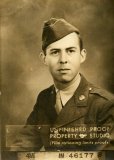The Internet - Good or Bad?
 At first glance the Internet seems to be a wonderful thing. An amazing amount of information is available with nothing more than a click of the mouse. It is easy, however, to discover much more than you care to know on a subject. For example, I looked up "Stodghill" and found there were 110,000 entries. That's an astounding number to a man my age who has never once encountered another Stodghill.
At first glance the Internet seems to be a wonderful thing. An amazing amount of information is available with nothing more than a click of the mouse. It is easy, however, to discover much more than you care to know on a subject. For example, I looked up "Stodghill" and found there were 110,000 entries. That's an astounding number to a man my age who has never once encountered another Stodghill.Some of the people listed seem quite prominent even though I had never heard of them before Google. There is a Ron Stodghill who apparently is a widely-known writer for a variety of publications including Time magazine. There are doctors, professors and just about anything else a person could name, yet I had never heard of even one of them.
My grandfather's first name was Chambers, and that's another first. I've known people with the last name Chambers, but who would saddle a newborn kid with a first name like that? My great-grandparents, whoever they were. Chambers didn't fit the rather staid and upright image that the name brings to mind. He was a factory worker and a tobacco chewer who liked to spit into the wind when he was walking beside my father so the gooey mess would end up on him. He used expressions like, "It's enough to give a dog's ass the heartburn" and he enjoyed deliberately mispronouncing words because he knew it irritated his only son.
And while a young man, Chambers was a street brawler in the Indiana towns of Aurora and Rising Sun along the Ohio River and in Warsaw, Kentucky on the opposite shore. Dad, who was not at all inclined to take part in such things, still seemed rather proud when he told of Martin Stodghill having his nose bitten off in one of the melees. Apparently the entire Stodghill clan in that part of the country liked to take part in fights and neighborhood donnybrooks.
One thing about the Internet, it strips a person of all privacy. And one piece of information I came across makes me wonder how much of it is true and how much isn't. I write a series of short mysteries and novelets that appear in Alfred Hitchcock Mystery Magazine. The central character is a private eye named Jack Eddy but the narrator of the stories is a newspaper reporter by the name of Bram Geary, the Bram being short for Abraham. I just picked his name out of thin air because I wanted it to be one syllable linked to two syllables. I didn'teven think about Geary being an Irish name although that is a plus, of course.
The Thrilling Detective website has this to say about the series: "Twenty-six years old with a receding hairline and a fistful of ambition, Jack Eddy is an op for the Akron, Ohio branch of the Wellington National Detective Agency, circa 1937. He's slick, brash, and prone to cutting corners, much to the dismay of young, and at times surprisingly naive crime beat reporter Bram Geary, the narrator of this series of short stories. Both Jack and Bram live at Mrs. Bauer's boardinghouse. Poor ol' Bram usually ends up far more involved in Jack's cases than he would like. The 'aw shucks' narration style, and the very real violence of the times give these tales a rather unique flavor, as though John Boy was writing for Black Mask. Now there's a concept for you. "
But poor ol' Bram does get around. On the Internet there is a web site named Geary Central. It is a place where people of that name search out information on ancestors and pass along what they find to others of the same name. So who should show up in it? None other than Bram. The site says this about him: "Crime beat reporter Bram Geary is the narrator of the ongoing Jack Eddy series of short stories by Dick Stodghill, published in Alfred Hitchcock's Mystery Magazine."
How many members of the Geary clan, I wonder, fail to reaize that this is a fictional series and Bram actually exists only in my mind?










